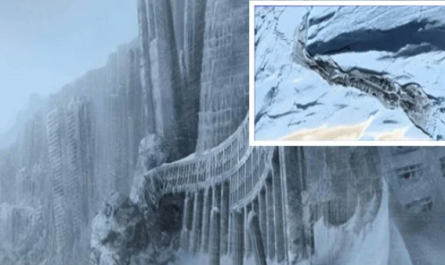The lullaby Rock-a-Bye Baby is one of those timeless melodies, sung softly to soothe generations of children to sleep. Its gentle rhythm and simple lyrics evoke a sense of comfort, yet the words—about a cradle falling from a treetop—carry a hint of mystery. Where did this song come from, and what does it really mean? A lesser-known story ties this beloved lullaby to a poignant moment of cultural exchange and a mother’s bittersweet reflection on her child’s future.

Many years ago, Effie Crockett, said to be the older sister of the famous frontiersman Davy Crockett, visited the Muskogee (Creek) Tribe to assist some of the mothers in their community. When she arrived at their camp in the southeastern woodlands, she was met with an unexpected sight that made her chuckle with surprise. Unlike the cradles she was used to seeing on the ground, the Muskogee babies were gently tied in small cradles, hung from the sturdy branches of birch trees, swaying softly in the breeze.
At first, Effie found the practice unusual. But as she spent more time with the Muskogee, she began to see the wisdom in it. High above the ground, the babies were safe from crawling insects, the scorching sun, and curious wild animals. The wind rocked the cradles gently, mimicking the comforting embrace of a mother’s arms. The infants lay peacefully, their eyes following the flutter of birds, the dance of butterflies, and the rustle of leaves in the canopy above. The fresh air brushed their skin, and they seemed to smile at the world around them.
One day, Effie witnessed a moment that stayed with her forever. A Muskogee mother gazed up at her child, nestled in a treetop cradle, and began to sing softly in her native language. As she sang, a single tear rolled down her cheek. The song’s meaning, as Effie later learned, was both tender and profound:
Rock-a-bye baby, on the tree top,
When the wind blows, the cradle will rock,
When the bough breaks, the cradle will fall,
And down will come baby, cradle and all.
Effie was so moved that she wrote down the song and shared it with others. Over time, it spread beyond the Muskogee camp, becoming the lullaby we now know as Rock-a-Bye Baby. But for most, the song’s deeper meaning remained hidden.
The Muskogee mother’s tear wasn’t shed out of fear or sadness for a literal fall. Instead, it reflected a universal truth about parenthood. The “branch” holding her baby would one day break—not from danger, but from the natural course of life. Her child would grow, outgrow the cradle, and “fall” to the ground, ready to stand on their own. The falling cradle wasn’t an end but a beginning—the moment her baby would no longer need her constant protection and would step into the world as an independent person.
This interpretation transforms Rock-a-Bye Baby from a simple lullaby into a powerful metaphor for the journey of parenthood. The Muskogee mother’s song captures the joy of nurturing a child and the quiet ache of knowing they will one day leave the safety of the cradle to forge their own path. The practice of hanging cradles in trees, while not widely documented, aligns with the Muskogee’s deep connection to nature and their innovative childcare traditions. It’s a reminder of how cultural practices can inspire universal stories, resonating across time and place.
Next time you hum Rock-a-Bye Baby, think of that Muskogee mother, singing to her child swaying in the treetops. Her song wasn’t just about sleep—it was about love, growth, and the beauty of letting go.





